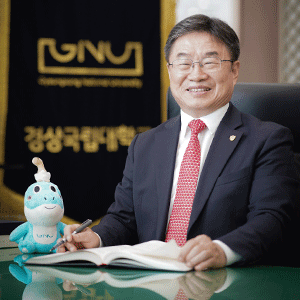
The paradigm of the agriculture industry is evolving in this fast-changing era of the global community. Soon, agriculture will be located at the centre of the future era, and this necessitates certain changes in the industry to enable it to address food problems through surplus production, which can solve various social problems such as famine, health, human welfare, climate change, and environmental conservation. Therefore, the direction of agricultural education should also be developed into GLOCAL education to solve problems in the global community based on field-oriented education for problem-solving in the local agricultural industry.
Gyeongsang National University (GNU) aims to provide agricultural education that can nurture global talents who can contribute to the achievements of the common Sustainable Development goals presented by the United Nations, apart from traditional agricultural education. The university strives to strengthen problem-solving convergence education by combining various academic fields such as humanities, social sciences, and Artificial Intelligence (AI) along with agriculture and life sciences to develop a better undergraduate and graduate education system.
The courses offered at GNU facilitate the development of students, complex and comprehensive competencies including general competencies. The university has an expanded customized liberal arts curriculum for its students to help them cope with the rapidly changing future society and strengthen the quality management of education through the liberal arts curriculum accreditation system.
“After we integrated with Gyeongnam National University of Science and Technology in 2021, GNU and its College of Agriculture and Life Sciences were enabled to secure human and material infrastructure comparable with high-ranking flagship national universities. GNU College of Agriculture and Life Sciences secures worldclass competitiveness along with GNU’s three specialized fields of Aerospace and Mechanical Engineering, Life Sciences, Nano and Advanced Materials, and Chemistry”, informs Soon-Ki Kwon, President, GNU.
Enabling Holistic Development
GNU emphasizes interactive sessions between students and professors so that all members of the learning ecosystem can organize, apply, and practice knowledge through participation, cooperation, and sharing. The University Systems of Gyeongnam (USG) Complex Learning Centre has a digital TransLab, zoom classrooms,
and distance learning lecture rooms enabling lectures between universities. Apart from this, it also has students’ clubrooms at the Student Union Building and an outdoor concert hall for students’ performance activities to ensure extra-curricular activities on campus. There are various extra-curricular activities that the students participate in for overall development.
These include the GNU volunteer group supporting rural communities, mural painting of old residential areas, and overseas volunteer activities to promote Korean culture, languages, and Taekwondo, to developing countries. The university also offers the Global Pioneer Program in which groups of students travel overseas every year to explore foreign cultures, languages, global companies, and institutions. Other activities involve student exchange, double degree programs, overseas English programs, and many other extracurricular programs for international students (i.e. Korean Buddy Program).
GNU conducts various industrial collaborations to ensure placements and internship opportunities for its students. The university performs consultation with students and companies with regard to field training programs, offers insurance coverage, and provides orientation prior to the field training. GNU conducts special lectures, mentoring, camps, and briefing sessions related to career and employment to help students in the career-building process.
This also involves numerous internship programs linked to local companies, consultation of career exploration and career setting, and holding employment briefing sessions and job fairs. It also supports students’ growth by granting scholarships so that they can achieve their dreams. The university offers scholarships for outstanding academic achievement, underprivileged family background, and student competency activities, to name a few, to both undergraduate and postgraduate students.
GNU and its College of Agriculture and Life Sciences is an educational cornerstone, with a tradition of more than 110 years, that helps all stakeholders realize their dreams & hopes
Empowering Trainers & Faculty
The faculty members and teaching staff are educated with various teaching skills and methods to keep them up to date with the demand of the continuously evolving trends in the market. “There are various faculty development programs like Learner Centred Interaction Teaching Methods, Creative Problem-Solving Teaching Methods, Digital Learning Facilitation, and Blended Teaching Strategies. In order to manage the quality of the faculty members, we are introducing dynamic lectures and practical programs that can accommodate various demands of learners while flexibly responding to the rapidly changing educational environment”, says Soon-Ki Kwon.
Robust Roadmap
GNU aims to train convergence talents for the fourth Industrial Revolution and the era of digital transformation through educational innovation. It also wants to strengthen lifelong education according to the aging population and adult learners and become a hub for regional innovation through linkage and cooperation with local government and industries. Based on educational and research innovation to enhance students’ competitiveness and create future value in preparation for the future society, GNU aims to strengthen its industry-academic competitiveness. It wishes to become a world-class university through dataoriented management innovation.
Soon-Ki Kwon, President
Dr. Soon-Ki Kwon was the 9th President and was re-elected as the 11th President of Gyeongsang National University. He studied at Seoul National University and got a Ph.D. at KAIST, majoring in chemistry. He is a seasoned professional and brings to the table years of industry experience and leads GNU to become a world-class university
We use cookies to ensure you get the best experience on our website. Read more...